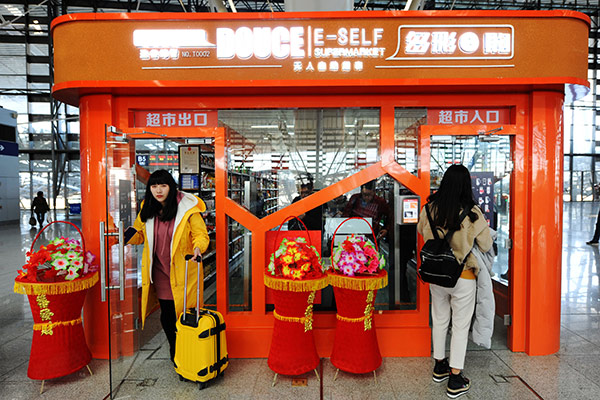Chinese brands earn youth's trust


Chinese millennials, or people born in the late '80s and early '90s, and the internet generation, or those born after 1998, recognize major domestic brands better than well-known international brands, according to an AT Kearney report.
The global consultancy surveyed more than 7,000 consumers in different age-group across China, Japan, India, the United States, the United Kingdom, France and Germany, and found several trends that will drive markets in the future.
The report found that 71 percent of internet native consumers in China showed an increasing trust in major domestic brands, whereas 57 percent of those showed an increasing trust in international brands.
"Chinese consumers, especially the young generation, have significantly increased their trust in local big brands. This signals a very positive sign for the rise of Chinese brands," said He Xiaoqing, partner and head of consumption and retail industry at AT Kearney Greater China.
"Compared with five years ago, well-known international brands will have an increasingly difficult time to gain or retain consumers' trust merely by offering quality products and services," she said.
In the next 10 to 20 years, young Chinese born in the digital age will become the largest consumer group.
The report showed that instead of swearing by big brands, about 60 percent of them are expected to prefer brands that commit to social causes, support environmental conservation and have distinctive brand values.
This trend is particularly obvious in the food sector, with 93 percent of millennials and the internet native consumers willing to pay an extra 5 percent of the price for those products that are environmentally friendly or with a strong sense of social responsibility.
Young Chinese consumers also tend to pay attention to the history of the brands, the report said.
The gradual loss of trust in big international brands has been particularly significant in the UK, France, the US, and Germany.
Now in China and India, they are still able to play the "cool kid" and "quality" cards. In the next few decades, however, it will be a different situation in China, as the younger consumers showed less trust compared to older generations, the survey stated.
The report found that in today's age of hyper-connectivity and social networking, individual voices can be amplified to influence the entire market, and companies are facing significant risks of losing their brand values in a short time.
For instance, in April, a video showing a man being violently dragged off an overbooked United Airlines flight has led to an uproar on social media, and later the market value of the airline shrunk by $1 billion.
"Consumers in the old world were defined by their possessions, and companies were able to meet their customers' needs to an adequate degree with static business models and a 'one size fits all' marketing strategy that followed major trends," AT Kearney's He said.
"But now, the new business model calls for highly differentiated approaches, which rely on individual influencers and those who are capable of immediately understanding consumers' signals and translating them into action."
In this case, one of the most important steps is to identify the right "influencers", also known as KOLs, or key opinion leaders.
The report also introduced the concept of "macro influencer", such as sports or pop-culture stars with huge number of followers of their social media accounts, as well as "micro influencer", who are likely to be more segmented.
For example, "micro influencers" can be bloggers with a fashion sense or foodies. They have fewer followers, but may have more impact than macro influencers because they engage more actively with their followers and therefore build trust more effectively.




































